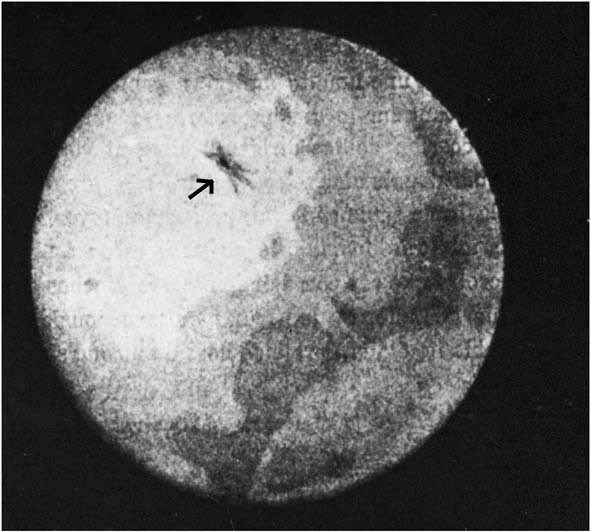1883
-
1883.0812 Bonilla photos
On 12 August 1883, photographs were taken by astronomer Jose A y Bonilla at the Zacatecas Observatory in Mexico of objects crossing the face of the Sun.
In 1885, the French publication “L’Astronomie” published an observation by Jose A y Bonilla, the director of the Zacatecas Observatory in Mexico, northwest of Mexico City. Bonilla’s account included the following:On August 12, 1883 at 8am, I was starting to outline the solar spots when all of a sudden I caught sight of a small luminous body, which was entering the scope of the telescope, standing out on the paper I used to reproduce the spots, and wandering over the solar disc, projecting itself like a shadow almost circular.
I had hardly recovered from my surprise when the same phenomenon happened again and at such short intervals that within 2h. I was able to count up to 283 bodies crossing the solar disc.
Bonilla took several photographs which he sent to “L’Astronomie”.
Claims to fame
Several researchers have referred to these photographs as “the first UFO photographs”.
During 2003-2007, Isaac Koi reviewed a sample of 963 UFO and SETI books and noted the frequency with which various UFO cases were discussed. This incident is Case 87 in Isaac Koi's "Top 100" article, since it was referred to in 32 of the books covered by that article. The Bonilla photos featured in a list of the top 10 photographic cases (in terms of frequency of discussion). This incident was the eighth most frequently discussed UFO photographic case in the study, with 32 discussions being noted.Isaac Koi’s “ICES” Rating for this sighting = 5544 (out of a potential score of 14*14*14*14 i.e. 38416)
(1) “Impact” Rating of 11 (out of a potential score of 14), because it is Case 87 in Isaac Koi's "Top 100" article.
(2) “Credibility” Rating of 12 (out of a potential score of 14), because no-one appears to have identified any evidence that the photographs are faked or been altered (or, indeed, that Bonilla's account is untrue or inaccurate in any way). The debate regarding this incident has been about what the relevant "bodies" seen on the photographs actually are. However, the incident is not assigned a “Credibility” Rating higher than 12 because the discussions of this case set out in the table below are generally not very detailed and a more detailed examination of the photograph (or Bonilla's accompanying account) possibly may reveal additional relevant evidence.
(2) “Expert” Rating of 7 (out of a potential score of 14). It is given this neutral rating because (at the time of writing) it has not been included in any of the short lists of the best cases produced by various UFO researchers that have been compiled by Isaac Koi (see the “Best UFO Cases" article at PART 3: Existing lists by various individuals), nor it is frequently mentioned as a good example of a hoax or misperception.
(4)“Strangeness” Rating of 6 (out of a potential score of 14): While the true nature of the "bodies" shown on the photograph are not immediately obvious upon looking at the Bonilla photos, there are no details or structures visible that rule out a number of mundane explanations (e.g. birds or insects). Similarly, Bonilla's accompanying account does make a specific mundane source clear but does not provide any details which (even if they are all true and accurate) would exclude a number of mundane explanations. The Bonilla photos are therefore given a relatively low “Strangeness” Rating. It would be helpful to have the photos considered by somone familiar with taking photos of the Sun and/or to compare the Bonilla photos with photos of various objects crossing in front of the Sun.
In Larry Hatch’s *U* database this sighting is assigned:
(1) a Hynek Strangeness Rating of 6 by Larry Hatch (out of a potential score of 10), and
(2) a Hynek Probability Rating of 9 by Larry Hatch (out of a potential score of 10).
Multiplying together the two ratings assigned by Larry Hatch results in a score of 54 (out of a potential score of 100).
The Skeptics
Editors of “L’Astronomie”
In a note following Bonilla’s article, the editors of “L’Astronomie” comment that:- The observation “is not easy to explain”
- However, the editors “believe that objects in question are birds, insects, or high atmospheric dust, anyway, corpuscules belonging to our atmosphere”.
Lore and Deneault
In their book “Mysteries of the Skies” (1968), Gordon Lore and Harold Deneault comment that the speed of the objects would “seem to exclude either insects or birds” but also suggest that “the number of objects would tend to argue against Bonilla’s having [seen] anything so exciting as extra-terrestrial vehicles”.Sections below:

 "Impact" Rating = 11
"Impact" Rating = 11 "Credibility" Rating = 12
"Credibility" Rating = 12 "Expert" Rating = 7
"Expert" Rating = 7 "Strangeness" Rating = 6
"Strangeness" Rating = 6